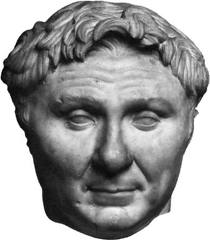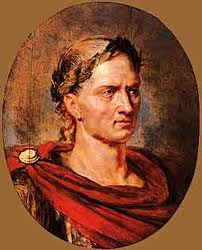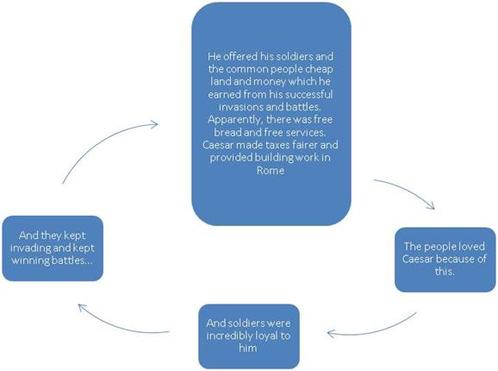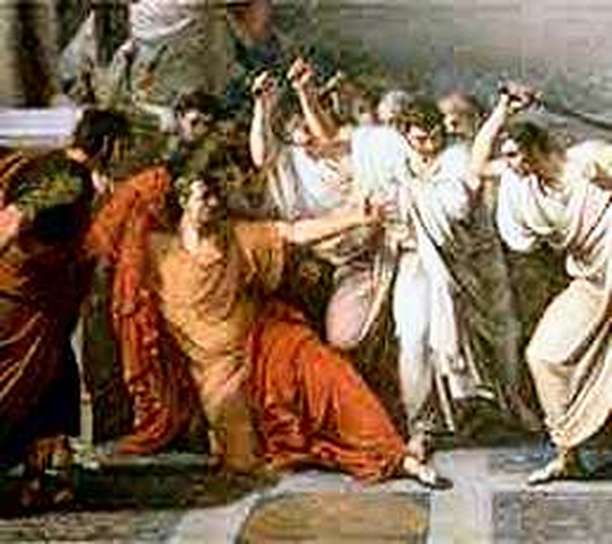Trouble brewing in the Republic?
In the first century B.C., Rome faced many problems and threats, including rebelling slaves in Sicily in 73 B.C. and Pirates attacking strongholds in the eastern Mediterranean. Rome depended on army generals like Pompey and Julius Caesar to deal with threats to Rome. They had been successful dealing with the problems above.
The two men were friendly AT FIRST, but they became deadly rivals as each tried to become more powerful than the other.
|
POMPEY :
· Removed the pirates out of the Mediterranean
· Won back Asia Minor (modern Turkey)
· Conquered Syria and Palestine · Had the support of the Senate |
CAESAR:
· Led his army to conquer the whole of Gaul
· Sent an expedition over to Britain
· Was a popular hero with his troops and with the ordinary people of Rome – but not the senate...
|
The senate disliked Caesar and ordered him to get rid of his army. Caesar ignored them and at the Battle of Munda, defeated Pompey.
There were many civil wars during Rome in the first century B.C., as many high-ranking patricians such as consuls fought to be more powerful than each other. Below is a very notable Battle that finished off Caesar’s biggest rival.
Battle of Pharsalus
The Battle of Pharsalus was the decisive battle of Caesar's Civil War that ultimately sent Pompey to his deathbed after he fled to Egypt. On 9 August 48 BC at Pharsalus in central Greece, Gaius Julius Caesar and his allies formed up opposite the army of the Republic under the command of Gnaeus Pompeius Magnus ("Pompey the Great"). Pompey had the backing of a majority of senators, and his army significantly outnumbered the experienced legions of Caesar.
Although Pompey had a larger army, he knew that Caesar's troops were more experienced, and might win in a pitched battle. Instead, Pompey attempted to starve them by cutting off Caesar's supply lines. Caesar made a near disastrous attack on Pompey's camp, and was forced to pull away to regroup.
Pompey did not immediately follow up on his success. An winter of blockade and siege followed. Pompey eventually pushed Caesar into Thessaly and, urged on by his allies in the senate, he confronted Caesar near Pharsalus.
There was significant distance between the two armies, according to Caesar. Pompey ordered his men not to charge, but to wait until Caesar's legions came close. The idea was to tire Caesar's men before the battle started.
Seeing that Pompey's army was not advancing, Caesar's men, without orders, stopped to rest and regroup before continuing the charge. Caesar, in his history of the war, would praise his own men's discipline and experience, and question Pompey's decision not to charge.
When the lines joined, Labienus (Pompey's cavalry leader) ordered the cavalry to attack. At first they did well, and Caesar ordered his cavalry to withdraw. Light troops fiercely attacked Pompey's cavalry. The first line of the Pompeiian horse were panicked by the cohort's javelins and caused the entire cavalry to fall into disorder. When the cavalry retreated, Caesar's men slaughtered the light troops who supported them. They attacked Pompey's left flank and, rejoined by their cavalry, were able to get behind and attack Pompey's army from the rear. Caesar then ordered his as yet uninvolved third line to assisst the front ranks. The remaining Pompeiian soldiers fled and soon the main battle was done.
Pompey retreated to his camp and ordered troops to strongly defend it. Caesar urged his men to capture the enemy camp. They furiously attacked the walls. The Thracians and the other auxiliaries who were left in the camp defended bravely, but they were not able to fend off the enemy assault. Pompey fled with a group, claiming that he had been betrayed. Caesar had won his greatest victory, having lost only about 200 soldiers and 30 centurion.
The Battle of Munda
In Hispania, the sons of Pompey, Gnaeus and Sextus, along with Caesar's former legate Titus Labienus had continued to resist Caesar's dominance of the Roman world. However, they were finally defeated by Caesar and his dominance of power continued to grow.
This power, however, began to have its effects on Caesar. By the time he returned to Rome in September of 45 B.C., the abundance of rewards and honours given to him by the Senate and Roman elite were irreversibly alienating him from the high-ranking patricians. Conspiracy began to take root and the inevitable end was now only a few months away.
Caesar returned to Rome as
DICTATORafter the final defeat of the Republican faction in the Battle of Munda.
Why the Plebeians liked Caesar so much and why the senate hated him.
Caesar was generous to his army and the people.
THE SENATORS, ON THE OTHER HAND:
· Thought he was becoming too powerful.
· Some thought he wanted to become king, meaning the end of the Republic. But of course, the ordinary people didn’t mind him being dictator for life. (Even though he had not been elected).
· Some of the senators were jealous of him.
· The senators disliked Caesar because he “was arrogant and acted as if he was superior”.
· As Caesar was “on the side of the plebeians and most of the high-ranking jobs in the senate were all taken by PATRICIANS,” the senate was worried that Caesar wanted to make the senate less powerful.
Inevitably, the hatred of the senators resulted in this:
The Assassination of Gaius Julius Caesar:
On the morning of March 15th, 44 B.C., the Ides of March, Caesar awoke to find his wife Calpurnia in a near panic. According to reports, nightmares had submerged her dreams the night before, warning her of impending danger to Caesar. This was to be the senate's and Caesar's last meeting before he was due to leave for Parthia 3 days later.
His wife's concern seems to have made an impact. While the Senate and the conspirators anxiously awaited Caesar to arrive at Pompey's theatre, Caesar decided to heed his wife's pleas. He sent word to Antonius (Mark Antony) to dismiss the Senate based on menacing religious omens.
Meanwhile, the Senate were gathering at Pompey's theatre, likely to grant Caesar one final and particularly honour which they envied:the title of king of all Roman territory outside of Italy. The conspirators snuck in daggers, some in boxes intended for documents, others just concealed in folds of their togas. When Caesar arrived all involved were expected to approach Caesar and stab him at least once each, thereby spreading the 'guilt' among them all.
A s time passed in the morning hours, it soon became evident that Caesar might not show at all. When word was delivered that this was indeed the case, the conspirators were likely on the verge of panic. This would simply be the only reasonable time when the plot could take place and it was imperative that Caesar could come to the Senate meeting. Decimus Brutus, Caesar's close friend and likely the least suspected member of the group, was dispatched to Caesar's home to convince him to come. He mocked the omens that supposedly prevented Caesar from coming . He dismissed Calpurnia's dreams as “silly” and stimulated Caesar's vanity by suggesting that the Senate was ready to vote him in as King. By eleven o'clock it seems that Caesar was convinced of the rightness of attending the meeting and set out with Decimus Brutus, despite his wife's intensifying pleas.
And this is where it starts to get bloody…
While the praetors Marcus Junius Brutus and Gaius Cassius Longinus (both important members of the plot) kept the Senate busy by conducting usual state business during the morning hours, Caesar made his way towards Pompey's theatre. While he travelled, two meetings occurred, though they are unlikely to have happened. The first meeting was with a man, supposedly named Artemidorus, who approached Caesar and handed him a scroll revealing the plot. Caesar, however, because of the great crowds that always approached him as he travelled the streets of Rome, was unable to read it. The second incident came with the soothsayer Spurinna who originally warned Caesar to beware the Ides. Upon seeing here, Caesar said "The Ides have come", as if suggesting that there was really nothing to fear. The reply was simple but eerie, "Aye Caesar, but not gone ."
Caesar finally approached Pompey's theatre and made his way inside. The Senators took their seats along with the conspirators, as if nothing was amiss. Trebonius kept Mark Antony outside the meeting as planned and Caesar took his place. As usual, Senators approached Caesar to petition him with various things, but this time, he was approached by 60 men ready for a murder that would shake the Roman world.
Tillius Cimber was the man expected to deliver the first stabbing. The conspirators
gathered more tightly around him, forcing Caesar to stand. Cimber then grabbed and pulled Caesar's purple robe from his shoulders, the signal to
send the conspirators into action. Publius Servilius Casca, who positioned himself behind Caesar, was the first to strike. He stabbed
Caesar in the upper shoulder, near the neck and a historian - Plutarch - wrote that Caesar said, "Vile, Casca" or “Casca, what is this?” He apparently grabbed Casca's arm, stabbing it with his own writing pen, probably still completely unaware of the plot. But not for long...
The assassins stabbed Caesar relentlessly, each taking a shot at the dictator.
The attack was so rapid and vicious that several conspirators wounded each other. Brutus was wounded in the hand by a dagger, as he himself stabbed Caesar in the groin. Though the line made famous by Shakespeare, "Et tu , Brute?" (translated as "You too, Brutus", "You too, my son", or "even you Brutus") was supposedly spoken by Caesar as he saw Brutus
approach, this is likely a complete dramatic fabrication. The ancient sources suggest that Caesar said nothing and this seems most
likely, considering the ferocity of the attack.
Caesar pulled the folds of his toga over his head so as to prevent anyone seeing his face at death. In all, Caesar was stabbed 23 times and inevitably collapsed.




